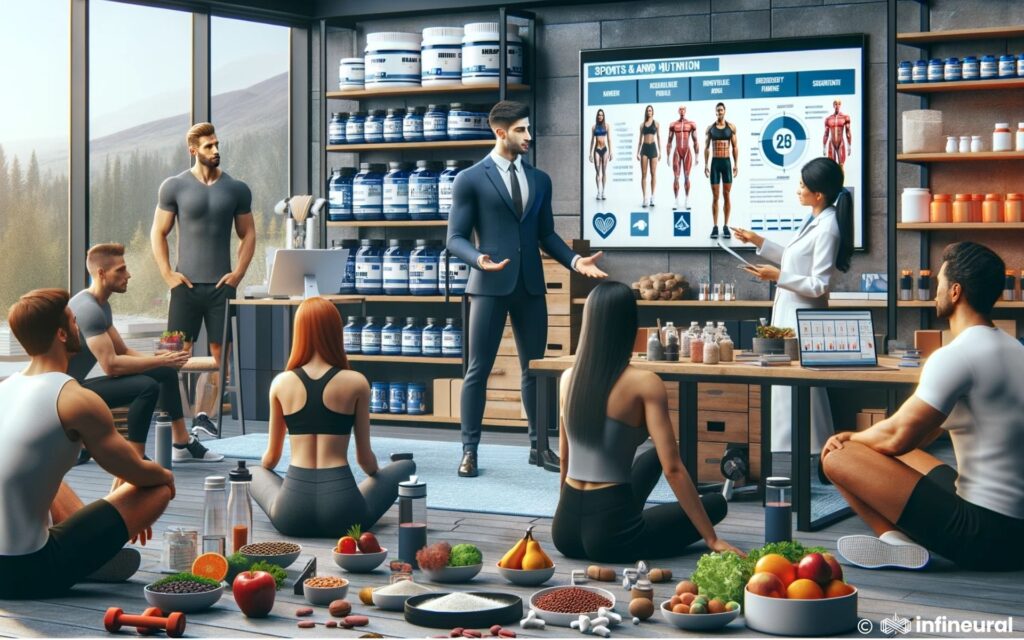Career in Sports and Exercise Nutrition
Imagine the roar of the crowd, the adrenaline coursing through veins, the athlete on the brink of victory. But behind every triumphant moment lies a silent architect – the sports and exercise nutritionist. More than just meal plans and protein shakes, their expertise fuels performance, optimizes recovery, and shapes champions.
The Burning Heart of Performance: Why Choose Sports Nutrition?

This isn’t just a career; it’s a calling ignited by a passion for health, sports, and human potential. It’s witnessing the intricate dance of science and sweat, where meticulous calculations translate into peak performance. You become the confidante, the strategist, the silent warrior fueling dreams from the sidelines.
Beyond Protein Shakes: Understanding the Nuances of Sports Nutrition
It’s a tapestry woven from physiology, biochemistry, and psychology. You delve into the unique demands of individual sports, crafting personalized strategies for endurance athletes, explosive powerhouses, and everything in between. You understand the emotional rollercoaster of competition, providing nutritional support that goes beyond the physical.
More Than Meal Plans: The Diverse Roles of a Sports Nutritionist
The world of sports nutrition is a vibrant ecosystem offering diverse opportunities. You could be the guardian of performance on elite teams, meticulously tailoring fueling strategies for Olympic dreams. Or, you could be the empowering force behind recreational exercisers, guiding them towards healthier lifestyles and achieving personal goals. You could even be the educational voice, shaping the future of sports nutrition through research, consulting, and academia.
From Classroom to Locker Room: Charting Your Course in Sports Nutrition
The journey begins with a solid academic foundation. Bachelor’s degrees or Distance Masters Programe in Sports Nutrition and Exercise Science, or Sports Nutrition pave the way, followed by postgraduate options like Master’s or Ph.D. programs. But theory needs practice. Internships and volunteer work with teams, athletes, or community organizations offer invaluable hands-on experience.
Sharpening Your Skills: Certifications and Specialization
Certifications like the Registered Dietitian (RD) or Certified Strength and Conditioning Specialist (CSCS) equip you with recognized expertise. Specializing in areas like performance nutrition, weight management for athletes, or sports dietetics elevates your profile and opens doors to specialized roles.
The Nitty-Gritty: Challenges and Rewards of a Sports Nutrition Career

This journey is not without difficulties. Long hours, demanding schedules, and performance pressure are the realities you face. However, the advantages are tremendous. Witnessing a triumph fuelled by your direction, seeing an athlete’s thanks, knowing you’ve been a part of their path – these are the moments that rekindle your passion.
More Than Just a Job: The Deeper Meaning of Sports Nutrition
Your impact extends beyond the finish line. You promote holistic well-being, empowering athletes to make informed choices for a lifetime of health. You champion mindful eating, dismantling harmful stereotypes around food and performance. You become a voice for inclusivity, ensuring diverse athlete populations have access to culturally sensitive and equitable nutritional guidance.
Championing Well-being: Promoting Holistic Health beyond the Finish Line
The playing field you influence extends beyond the stadium. You educate not just athletes, but coaches, parents, and the wider community, fostering a culture of healthy living. You debunk myths and misinformation, promoting evidence-based practices that prioritize long-term health over quick fixes. Your expertise ripples outward, shaping a future where sports nourish not just performance, but a holistic sense of well-being.
Breaking Barriers: Fostering Inclusivity and Diversity in Sports Nutrition
You recognize that the world of sports isn’t a homogenous landscape. You actively dismantle barriers around gender, race, socioeconomic status, and body image, ensuring equitable access to nutritional support for all athletes. You champion culturally sensitive practices, catering to diverse dietary needs and traditions. You become a voice for underrepresented communities, paving the way for a more inclusive and representative field of sports nutrition.
Fuel Your Future: Taking the First Step into a Thriving Career
This path might seem daunting, but every champion starts with a single step. Network with professionals, attend conferences, build your online presence. Embrace continuous learning, staying updated on the latest research and innovations in the field. Remember, the passion that ignited your interest will light the way as you navigate challenges and celebrate victories.
Networking Power: Building Connections and Finding Your Niche
Reach out to mentors, attend industry events, connect with fellow enthusiasts online. The sports nutrition community thrives on collaboration, and your network will be your bedrock of support and opportunity. Identify your specific interests and skills. Do you excel at working with elite athletes under pressure? Or do you find joy in empowering recreational exercisers on their fitness journeys? Finding your niche allows you to specialize and excel in a field that excites you.
Staying Ahead of the Game: Embracing Continuous Learning and Innovation
The field of sports diet is always changing. To stay on top of things, you should go to classes, read peer-reviewed journals, and have critical conversations with your coworkers. Be an expert; look into new technologies and ideas and add to the body of knowledge that is growing in the field of sports nutrition. Adopt a growth mindset and understand that you need to keep learning throughout your life to stay relevant and make money in this business that is always changing.
The Final Lap: Conclusion and FAQs
A career in sports and exercise nutrition isn’t just a job; it’s a calling to fuel dreams, champion well-being, and push the boundaries of human potential. It’s a journey of constant learning, adaptation, and resilience, paved with challenges and triumphs in equal measure. But for those with a burning passion for health, sports, and making a difference, the rewards are boundless.
FAQs:
What are the salary prospects for sports nutritionists?
Salaries can vary depending on experience, qualifications, and location. However, the profession is growing rapidly, with a projected 11% increase in job openings between 2020 and 2030, making it a lucrative career choice.
Do I need to be an athlete myself to be a sports nutritionist?
While personal experience in sports can be beneficial, it’s not essential. A strong academic foundation, relevant certifications, and hands-on experience through internships are more important qualifications.
Can I work with athletes as a freelance sports nutritionist?
Many professionals choose freelance work, offering their expertise to individual athletes, teams, or organizations on a contract basis. This provides flexibility and the ability to specialize in a particular niche.
What are the ethical considerations in sports nutrition?
Sports nutritionists have a responsibility to prioritize athlete well-being and uphold ethical practices. This includes avoiding harmful weight-loss practices, promoting evidence-based recommendations, and respecting athlete autonomy.
How can I make a difference in sports nutrition beyond working with individual athletes?
You can contribute to research, develop educational materials, or advocate for policy changes that promote healthy practices in sports. You can also mentor future generations of sports nutritionists, shaping the future of the field.
Remember, the field of sports nutrition is waiting for your passion and expertise. Take the first step, fuel your fire, and join the ranks of those who shape champions, nurture well-being, and push the boundaries of human potential.












